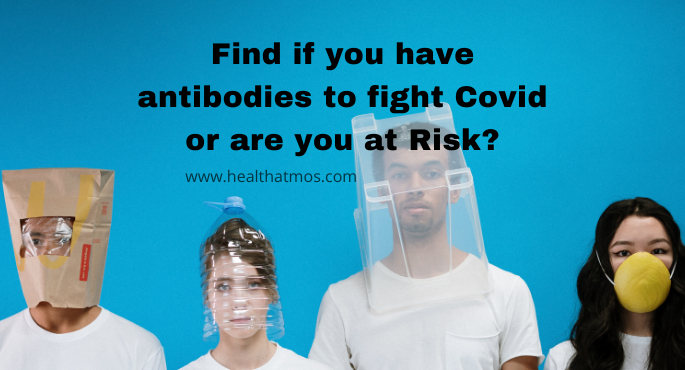What can Antibody Test for Covid Tell Us?
Antibodies are substances that your body produces in response to viruses and other infections in your blood. They are one of your body’s ways of fighting disease. Covid Antigen test is used to detect whether antibodies were produced in your body to fight against the COVID-19 virus. Antibody test for Covid involves taking a small amount of your blood and testing it for these antibodies. The antibody test is different from the swab test for COVID-19 that collects fluid from your nose and throat to check whether you have the virus now.
What is Covid-19 Antibody testing?
Antibody tests can detect certain types of antibodies related to the COVID-19 virus:
- Binding Antibodies – These widely available antibody tests detect whether you’ve developed any antibodies in response to a COVID-19 infection. But they don’t indicate how extensive or effective your immune response is.
- Neutralizing Antibodies – These are a newer and more sensitive test that detects a subgroup of antibodies and may inactivate the virus, but they are not widely available yet. This test is done after you test positive for binding antibodies and is another step toward finding out how effective your antibodies are in blocking the virus to help protect you from another COVID-19 infection.
Why is Covid-19 Antibody testing done?
Antibody testing for COVID-19 should be done if:
- You had symptoms of COVID-19 in the past but were not tested.
- You’re about to have a medical procedure done in a hospital or clinic, especially if you’ve had a positive COVID-19 diagnostic test done in the past.
- You’ve had a COVID-19 infection in the past and want to donate plasma, a part of your blood that contains antibodies that can help treat others who have severe cases of COVID-19
If a child is sick and the doctor suspect’s multisystem inflammatory syndrome for children (MIS-C), antibody testing may be ordered to help diagnose MIS-C. Many children with MIS-C have antibodies of COVID-19, indicating past infection with the coronavirus.
What are the risks of Covid-19 Antibody testing?
Results of COVID-19 Antibody tests may not always be accurate, especially if the test was done too soon after the infection, or the test quality is questionable.
- False-positive result – The test result is positive, but you actually don’t have antibodies and you did not have an infection in the past. A false-positive result could give you a false sense of security that you’re protected from getting another COVID-19 infection – and even with a true positive result, immunity is questionable.
- False-negative result – You have antibodies to the COVID-19 virus, but the test does not detect them, or you are tested too soon after infection and your body has not had the time to develop antibodies.
All this doesn’t mean the antibody tests are useless; they may still play a crucial role in helping us understand how to beat this pandemic.
What you can expect from Covid-19 Antibody testing?
To conduct an antibody test for COVID-19, a health care professional takes a blood sample, usually by a finger prick or by drawing blood from a vein in your arm. Then the sample is tested in a lab to determine whether you have developed antibodies against the COVID-19 virus.
COVID-19 antibody test results may be ready the same day as your test at some places. In other places, the test samples are sent out to a lab for analysis, so results may not be available for a few days.
What do the Covid-19 Antibody test results mean?
A positive antibody test shows that you have developed antibodies to the virus. This indicates that you have had the virus, even if you have not had symptoms.
The immune system is the name given to the different ways in which your body fights infections. Your immune system might have responded to the virus even if you did not feel ill and did not know you had COVID-19.
Knowing this information helps us to understand how many of the population have already had the virus. However, the test is not guaranteed to identify everyone who has had the virus. Some people who have been infected may still have a negative test.
It is important to stay alert even if you test positive for antibodies to the virus. COVID-19 is a new disease, and we are still learning how the immune system reacts to it. We do not know, for example, how long antibodies can work against the virus. We also don’t know if having antibodies means you can’t pass the virus on to others, or become ill with COVID-19 again yourself.
We will understand the virus better as we carry out more studies and collect more evidence. Until then, even though your test results show that you have COVID-19 antibodies, continue to take precautions which include wearing a face mask in public, frequently washing your hands and practicing social distancing — to avoid the risk of spreading the virus.
If you test positive for Antibodies, can you ignore Lockdown Restrictions?
No. There is no evidence yet to say that if you have already had the virus you are immune. Official advice from the World Health Organisation is clear about this.
You should continue to practice social distancing measures and follow Government guidelines. You must also do everything you can, such as frequently washing your hands, to prevent the spread of the virus.
How Long will it take to get my result?
It usually takes 24 – 48 hours from taking the blood test before the result is available.
Follow our blog for more health-related articles and get in touch to book a test.

